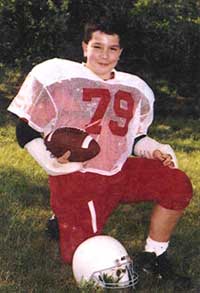
|
Angels
On Track: The Legacy of Ryan Moore
By Chris Sewell, Medill News Service
On March 25, 1995, 16-year-old Ryan Moore and five others were driving on rural
Deerfield Avenue in northeastern Ohio when the car they were travelling in was
struck by a Conrail freight train. Three survived, but Moore, 17-year-old Joshua
White, and 16-year-old Alyson Ley, were all killed instantly.
The site of the accident was, at that time, marked only with a crossbuck.
No warning gates, lights or stop signs existed. Including Moore’s accident,
the Deerfield Avenue crossing has claimed the lives of eight people since 1975.
There are neither lights nor warning gates at approximately 80 percent of all
public railroad crossings nationwide, according to the Federal Railroad Administration.
In the tragedy’s aftermath, Ryan’s parents, Dennis and Vicky
Moore, reluctantly found themselves faced with the issue of railroad safety.
Believing that Ryan’s death could have been avoided, the Moores established
The Angels On Track Foundation in 1996, a non-profit organization that awards
partial reimbursement grants to local highway authorities for railroad grade
safety upgrades.
If a county establishes a task force, Angels On Track will match the local
highway authority contribution, but will not exceed $40,000. The county must
also identify and prioritize all its grade crossings requiring improvement.
They operate the foundation from their hometown of Canal Fulton, Ohio."
The Moores' funding efforts have only been in Ohio so far, but they said they
are hoping to reach out to other states soon.
"The railroad companies need to make a concerted effort to protect people,"
Dennis Moore said. "But until the laws change, they’re not going
to do anything on their own."
To finance their efforts, the Moores use money they received in a civil lawsuit
filed against Conrail for the accident. The suit, which was filed jointly by
the Moore family and other families involved in the accident, charged Conrail
with conscious disregard for public safety.
They claimed Conrail knew the crossing on Deerfield Avenue was dangerous, but
did nothing to improve it.
"They [railroad companies] feel they have no responsibility for public safety," Vicky
Moore said. "The laws don’t tell them they need to make any safety
improvement efforts so they don’t."
A jury awarded the Moore family $7 million when it decided Conrail should
bear 45 percent of the responsibility for the accident. The jury ruled that
the remaining 55 percent of responsibility should be placed on the car’s driver, Ryan’s
older brother, Jason.
In post trial motions, the judge dismissed the jury’s conscious disregard
decision against Jason Moore.
Their main goal in establishing Angels On Track was to cut through and expedite
the bureaucratic process that can often make railroad crossing improvement take
longer than necessary. Currently, many states requiring safety improvements must
get federal approval, which can slow the process further.
The Moores said they have contacted members of the Ohio legislature to voice
their concern for railroad safety, but are frustrated by the delayed response.
"We’re tired of the people who should be working on this issue ignoring
it," Vicky Moore said. "We think the agencies that are supposed to
make the changes are turning a blind eye to this problem and meanwhile, people
are dying everyday."
Despite the accident in March 1995, and five deaths prior, warning lights
and gates were not installed at the Deerfield Avenue crossing until November
— eight months after Moore’s death.
"Ryan’s collision was preventable — they all are," Vicky
Moore said. "It’s not a priority until somebody is dead and then it’s
too late."
According to a 1999 study released by RailWatch, a Texas-based non-profit organization,
a car-train accident occurs every 90 minutes in the U.S. The study also indicated
that more than 500 deaths and 1,800 injuries resulted from these accidents in
1998.
"Our organization was formed because we want Congress to have in depth railroad
safety hearings," said RailWatch Executive Director Sherry Kiesling Fox. "We’ve
raised a lot of questions, but want Congress to use its investigative muscle
to get to the bottom of all these safety concerns."
RailWatch is a nationally-focused organization established one year ago. Mayors
and city council members from around the country founded it to address their
local railroad safety concerns.
"Our goal is to push the rail safety issue into the national spotlight because
it doesn’t receive the kind of attention it deserves,"
Fox said. "RailWatch hopes to give a voice to local concerns that are
really national concerns."
In addition to crusading for safer crossings, RailWatch addresses issues of defective
train equipment, overworked employees, poorly trained employees and hazardous
material transportation.
According to the RailWatch study, a train carrying dangerous cargo runs off the
tracks and forces an evacuation every two weeks in the U.S.
Realizing they were not alone in their fight, the Moores established the National
Railroad Safety Coalition (NRSC) that held its first meeting Nov. 20, 1999, in
North Canton, Ohio, to coordinate the efforts of smaller groups like theirs around
the country.
Most coalition members arrived in North Canton sharing a common bond of losing
a loved one in a rail accident.
"Every state in this country has a family just like ours," Vicky Moore
said. "Maybe they don’t know they can make a change and that’s
why we’ve set up the coalition."
About 30 members of grassroots groups from all over the country, including RailWatch,
attended to help give one voice to improving railroad safety. The group is hoping
to bring at least 500 people together for a meeting in the fall of 2000 in Washington,
D.C.
"We want to go to Washington to get the nation’s attention and the
attention of politicians," Dennis Moore said.
|
|
|